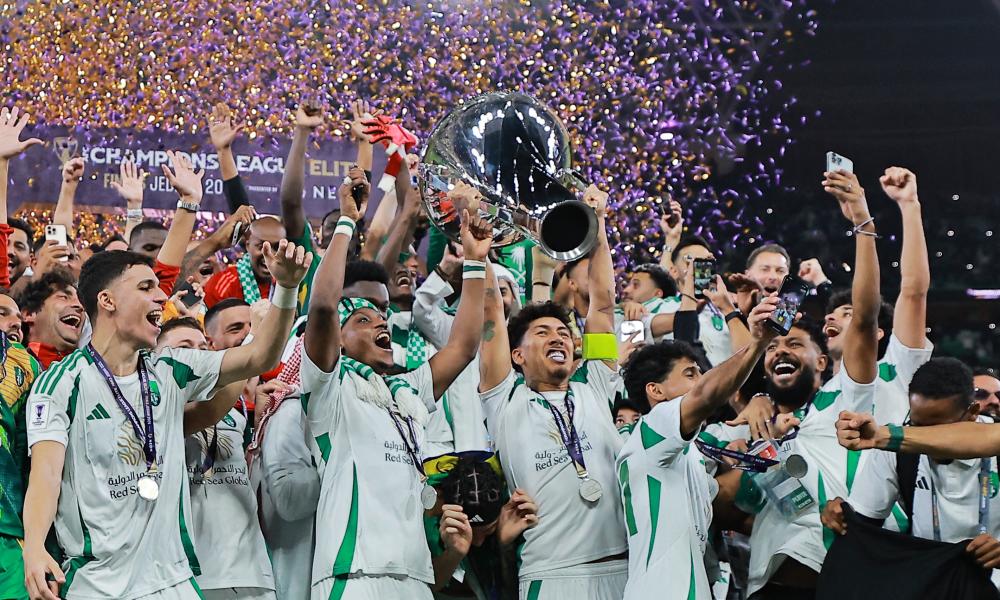It’s been quite a journey for Roberto Firmino, Riyad Mahrez and Al-Ahli, who lifted the AFC Champions League Elite trophy for the first time just before midnight on Saturday in front of 60,000 fans in Jeddah after a 2-0 win over Kawasaki Frontale of Japan.
Firmino has not been registered in the Saudi Pro League (SPL), where teams are allowed only 10 foreign players, this year. The former Liverpool man’s spot was taken by Galeno, his fellow Brazilian signed from Porto in January for around £45m. In Asia, however, there are no such restrictions and “Bobby” has come back into the fold and played so well that he was named tournament’s MVP.
Advertisement
Related: ‘It took a lot of money’: the Saudi boxing juggernaut comes to Times Square
“No words can express what I feel from the bottom of my heart,” a beaming Firmino said after he made both goals, the first a curling strike from his league replacement and the second a header from former Barcelona and Milan midfielder Franck Kessié. “They take me out of the league … but I don’t give up, I never give up.”
Mahrez almost scored a third for Al-Ahli that would have taken his tournament goals tally to 10. Questions over the Algerian’s weight and form seem like a long time ago now. Like his teammate, he adds the Asian Champions League title to the European one.
One day Al-Ahli’s head coach, Matthias Jaissle, will want to go the other way. Earlier this year, there were strong rumours that the 37-year-old German was to be replaced by the bigger-named Max Allegri. In Saudi Arabia, such reports are usually followed by a dismissal, but not this time, and the reward was a continental crown for a team that was in the second division a couple of years ago after a shock relegation.
Advertisement
The celebrations went on for hours. Jeddah, with its wide roads, Red Sea backdrop and the need to drive everywhere, does not feel like a football city upon first arrival, but it quickly becomes evident that, with another Asian champion in Al-Ittihad also calling it home, this is now firmly one of Asia’s hotbeds. That was the case before Saudi Arabia’s Public Investment Fund (PIF) took over the two clubs in 2023, as well as Al-Hilal and Al-Nassr in Riyadh, and started spending big.
The £800m spent in the initial transfer window and the deals that have followed have changed Asian football. In some ways, it has been a boost for the Champions League. The Asian Football Confederation (AFC) has never really known how to promote the tournament across the continent to vastly different markets and cultures. But then the likes of Cristiano Ronaldo, Karim Benzema, Neymar and the rest fell into their lap. The marketing did itself.
Suddenly, the Asian Champions League was big news in a way that had never happened before, except for a while, and nowhere near to the same extent, when Chinese teams spent big themselves a decade earlier. Saudi clubs were competitive before spending big, however, and adding world-class talent to strong contenders has had a fairly predictable effect on the pitch, and the ensuing domination is a concern. In that regard it was telling that five-time Japanese champions Kawasaki were cast as plucky outsiders going into the final by Al-Ahli and, ultimately, never really laid a glove on their opponents.
The scene was set with a new format that saw two groups of 12, one in the west and one in the east, replacing 10 groups of four. Reducing entry just when interest was growing was perhaps a misstep, but the hope was that standards would rise. They did at the upper end. In the group stage, Al-Hilal, Al-Ahli and Al-Nassr took the top three spots, winning 18, drawing five and losing only one of their combined 24 games.
Advertisement
The AFC had already decided to host all games from the quarter-finals onwards in Jeddah. Strangely – or perhaps not given that the political power in Asian football has long moved from east to west – not much was said. Yet when the last eight finally met, and the three local teams beat eastern opposition with a combined scoreline of 14-1, the problems with the decision were impossible to ignore.
Gwangju FC, a South Korean team making their continental debut, had a journey of more than 20 hours for a one-legged quarter-final against a team playing at home and with a wage bill 30 times higher than theirs. Al-Hilal ran out 7-0 winners, and even if the K-League team had managed a shock result there would have been a semi-final against Al-Ahli, a team roared on by 60,000 fans with a wage bill about 28 times higher than theirs. The new format reduced Gwangju’s chances of glory from small to almost nonexistent.
Saudi clubs, clearly the best in Asia, do not need automatic home advantage in the knockout stages, and neither does the tournament. There was nothing wrong with the old home and away format. It was fair and would mean that while Jeddah or Riyadh would still get the chance to host big games in spectacular fashion if their teams made it that far, so would everyone else.
Read the full article here



